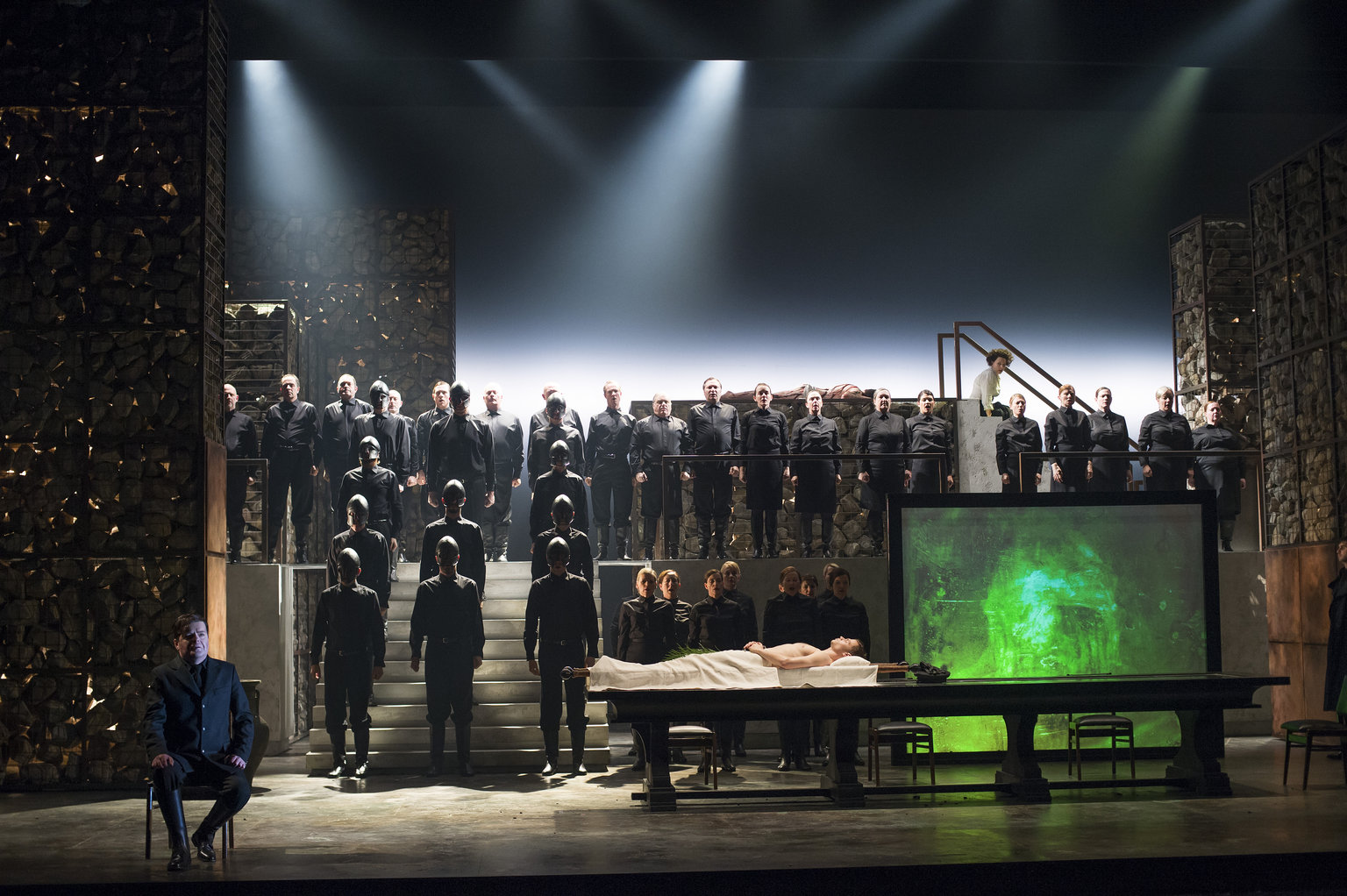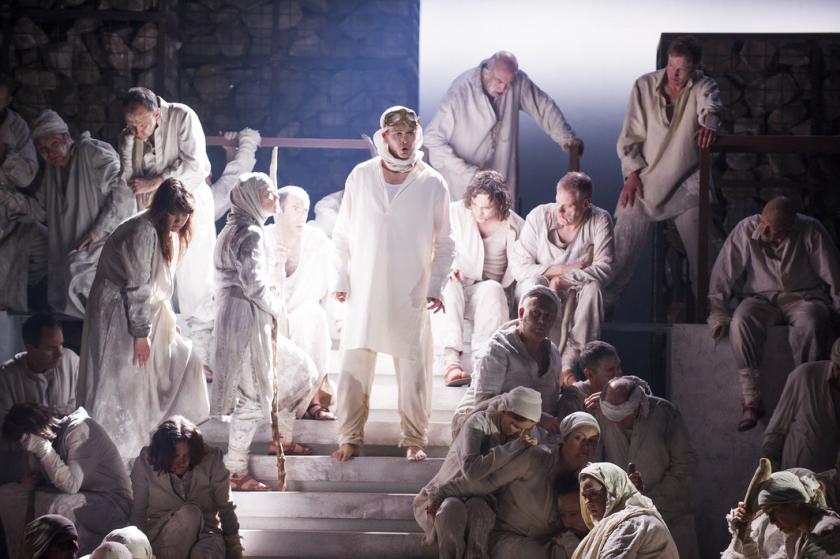It’s been a bloody week on the London stage. First Titus Andronicus maims and mutilates at the Globe, and now at English National Opera Frank McGuinness and Julian Anderson bring us a distillation of Sophocles’ three Theban plays, complete with eye-gouging and assorted hangings. But while Lucy Bailey found eloquent meaning in Shakespeare’s brutality, could Anderson do the same in this, his first opera?
This is thoughtful, hard-fought art that resists immediate assimilation. Thebans is the considered response to recent ENO premieres – the baffling Sunken Garden and insubstantial Two Boys – which concealed intellectual voids behind their digital trickery and gimmickry. Gone are the cutting-edge techniques and contemporary cool, and we’re back in opera’s favourite holiday destination of Ancient Greece.
Anderson and McGuinness are not telling us these stories, they are telling us about them
Each act condenses the action of one play from the original trilogy. We open with Oedipus the King, before reversing the chronologial sequence to place Antigone at the centre, finishing with Oedipus at Colonus. Labelled “Past”, “Future” and “Present”, the effect of the re-ordering of the three sections is to undermine any sense of narrative or contextual continuity. Individuals are less important than their repeating urges, motives, instincts, and though Anderson’s writing draws us in with intensely-felt arioso, his broader musical structure and ever-present chorus hold us at a distance.
 The trouble is that, with the longest act playing at around 50 minutes (and Antigone dispatched in an efficient 20), we’re given little time to care. With the action so telescoped, we open in tragedy and close in tragedy, with none of the ineluctable descent that makes the original plays so powerful. Instead of the usual sequential character development, we’re encouraged to embrace a more meditative approach. These are three variations on a theme: human frailty and desperation. Anderson and McGuinness are not telling us these stories, they are telling us about them.
The trouble is that, with the longest act playing at around 50 minutes (and Antigone dispatched in an efficient 20), we’re given little time to care. With the action so telescoped, we open in tragedy and close in tragedy, with none of the ineluctable descent that makes the original plays so powerful. Instead of the usual sequential character development, we’re encouraged to embrace a more meditative approach. These are three variations on a theme: human frailty and desperation. Anderson and McGuinness are not telling us these stories, they are telling us about them.
There’s no better painter of human weaknesses than Frank McGuinness, whose libretto is clean and direct, never indulgent in either word or emotion. His Creon is weak and urgent, lashing into action before doubts can even be acknowledged. Peter Hoare’s tenor is glossy and persuasive, a perfect musical politican and the natural father to Anthony Gregory’s radiantly-sung Haemon (a career-launching performance, surely). The vocal warmth of Roland Wood’s Oedipus (apparently ill, but with no sign of weakness) is the only sympathetic element of a character beset by doubt and anger. The jaunty dance rhythms that suddenly invade the writing as he describes his past (revelations that will ultimately lead to tragedy) are delicately horrible, the musical universe playing a joke on a still-happy man.
 Creon is defied with passion by Julia Sporsén’s Antigone – ferociously sung, desperate and beautiful. It is she who has the opera’s final word, crying out desperately in an empty wasteland. There’s no consolation here, no resolution, no lessons learned from so much bloodshed. Anderson and McGuinness leave us battered and baffled but aesthetically satisfied.
Creon is defied with passion by Julia Sporsén’s Antigone – ferociously sung, desperate and beautiful. It is she who has the opera’s final word, crying out desperately in an empty wasteland. There’s no consolation here, no resolution, no lessons learned from so much bloodshed. Anderson and McGuinness leave us battered and baffled but aesthetically satisfied.
Anderson’s characteristically glowing musical textures – shifting soundscapes lively with colour and texture – take on a harder edge here. There’s a rhythmic propulsion to the music, driven by a large percussion section, that offers the counterbalance to the high, denatured noises of woodwind and strings. This is music changing and growing in time, and the themes of each act all emerge out of the one before. Andersons’s writing is at its best for the chorus, muscular, architectural lines that offer the scattered figures (dusty, linen-clad peasants for Act I, fascist followers in Act II, and disembodied voices in Act III) a corporate identity stronger than any individual.
Pierre Audi’s direction gives the chorus a wonderful fluid unity, especially to their movement, finding the same shoal-like instincts as Willy Decker’s Peter Grimes. His soloists must exist within Anderson’s world of symbol and archetype, and they find a language of gesture and movement that effectively straddles the two.
Thebans isn’t confronting or provocative as Mark-Anthony Turnage’s Greek so memorably was. Myths are beginning and end for Anderson, rather than a point of departure and difference. He revisits familiar tales in order to meditate and enrich rather than challenge, and the effect is subtle and satisfying. This is a serious piece of music-drama, a quiet opera whose full worth will take time to emerge. It deserves an ongoing life.
- Thebans is at English National Opera until 3 June, 2014














Add comment